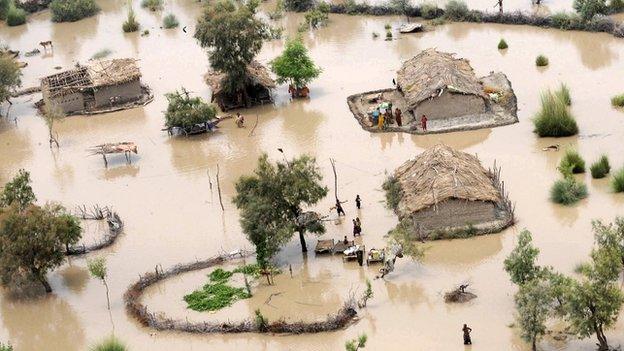Climate change: The possible effects
- Published
A selection of BBC reports on the possible effects of climate change in the UK and worldwide.
The impacts of global warming are likely to be "severe, pervasive and irreversible", a major report by the UN has warned.
Scientists and officials meeting in Japan say the document is the most comprehensive assessment to date of the impacts of climate change on the world.
Here is a selection of BBC archive video reports to illustrate what scientists say could be some of the biggest effects of climate change.
For a more detailed overview of science behind these changes, read the Q&A on climate change.
Melting ice
Human-induced warming is likely to lead to large-scale and potentially irreversible changes in physical systems such as the cryosphere (regions covered by snow or ice).
Melting ice will contribute to sea level rise, with consequences for coastal communities, ecosystems and cities.
BBC Science Editor David Shukman has been to visit the Ny Alesund research base in Svalbard
Changes to ecosystems
Global warming can force species to move to higher latitudes and higher altitudes where temperatures are better for their chances of survival.
It can also cause changes to seasonal events in the life cycle of a species.
Clams give clues to climate change
Acid oceans
The UN report says that there is conclusive proof that emissions of carbon dioxide (CO2) from modern society are turning the oceans more acidic.
Ocean acidification is likely to have widespread effects in marine species, including the loss of coral communities.
Roger Harrabin goes diving in Papua New Guinea to see the effect of CO2
Extreme weather events
Projections suggest a rise in extreme weather events, such as heavy rainfall, more intense storms and heat-waves.
Western Europe is prone to great variations in weather, but experts believe such events could become more frequent.
A look back at a year of extreme weather
Food supplies
Crop yields are likely to increase at higher latitudes under some scenarios of global average temperature increase - and depending on the crop.
At lower latitudes, especially the seasonally dry tropics, crop yields are likely to fall - even for small temperature rises, adding to the risk of hunger.
The increased frequency of both droughts and floods is expected to adversely affect agricultural production.
BBC reporters consider how severe weather is affecting food prices
- Published31 March 2014
